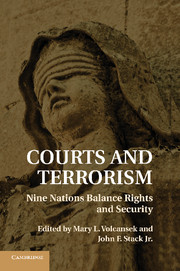Book contents
- Frontmatter
- Contents
- Contributors
- COURTS AND TERRORISM
- Introduction
- 1 Detentions and Security versus Liberty in Times of National Emergency
- 2 One More Casualty of the “War on Terror”
- 3 State Secrets and Democratic Values
- 4 What Lessons Can Be Drawn from a Sui Generis Case? The Global “War on Terror” and Northern Ireland
- 5 The British Experience with Terrorism: From the IRA to Al Qaeda
- 6 Detention and Treatment of Suspected Terrorists under the European Convention on Human Rights
- 7 Australia's Commonwealth Model and Terrorism
- 8 Judicial Rejection as Substantial Relief: The Israeli Supreme Court and the “War on Terror”
- 9 Preserving Rights and Protecting the Public: The Italian Experience
- 10 Squaring the Circle? Fighting Terror while Consolidating Democracy in Spain
- 11 From Exception to Normalcy: Law, the Judiciary, Civil Rights, and Terrorism in Colombia, 1984–2004
- Conclusion: Lessons Learned
- Cases Cited
- Statutes Cited
- References
- Index
9 - Preserving Rights and Protecting the Public: The Italian Experience
Published online by Cambridge University Press: 05 July 2011
- Frontmatter
- Contents
- Contributors
- COURTS AND TERRORISM
- Introduction
- 1 Detentions and Security versus Liberty in Times of National Emergency
- 2 One More Casualty of the “War on Terror”
- 3 State Secrets and Democratic Values
- 4 What Lessons Can Be Drawn from a Sui Generis Case? The Global “War on Terror” and Northern Ireland
- 5 The British Experience with Terrorism: From the IRA to Al Qaeda
- 6 Detention and Treatment of Suspected Terrorists under the European Convention on Human Rights
- 7 Australia's Commonwealth Model and Terrorism
- 8 Judicial Rejection as Substantial Relief: The Israeli Supreme Court and the “War on Terror”
- 9 Preserving Rights and Protecting the Public: The Italian Experience
- 10 Squaring the Circle? Fighting Terror while Consolidating Democracy in Spain
- 11 From Exception to Normalcy: Law, the Judiciary, Civil Rights, and Terrorism in Colombia, 1984–2004
- Conclusion: Lessons Learned
- Cases Cited
- Statutes Cited
- References
- Index
Summary
Throughout the 1970s, Italy was struck by a wave of terrorist attacks. Undoubtedly, at that time Italian terrorism was the most active of any country in Europe, and not surprisingly, it made a deep impact on the judicial system; the growth of judicial power in the 1980s and 1990s is strongly linked to terrorist activities in the 1970s. The fight against terrorism has deeply involved courts and the judiciary and ultimately influenced the way the judicial system has later confronted other criminal phenomena like organized crime and political corruption. None of these developments can be understood without considering the structure of the criminal justice process. Much of the success of Italy's fight against terrorism has been ascribed to its original criminal justice process, to its quick adaptation to the new challenge, and to the resulting strength of judicial powers.
Today, Italian terrorist groups, although always dangerous, seem to be largely dismantled. A stronger threat seems to be from international terrorists, especially Islamist groups, although so far no significant attack from international terrorists has occurred in Italy. Whether the Italian judicial system is still as effective as it has been in the past cannot yet be assessed.
THE ITALIAN JUDICIAL SYSTEM: ITS TRADITIONAL SETTING
In the late 1960s, before terrorism became a national emergency, Italian criminal justice was organized according to the European semi-inquisitorial style typical of the French Napoleonic tradition. The Code of Criminal Procedure enacted by Napoleon in 1808 influenced Italy and several other civil law countries (Damaska, 1986).
- Type
- Chapter
- Information
- Courts and TerrorismNine Nations Balance Rights and Security, pp. 169 - 180Publisher: Cambridge University PressPrint publication year: 2010



